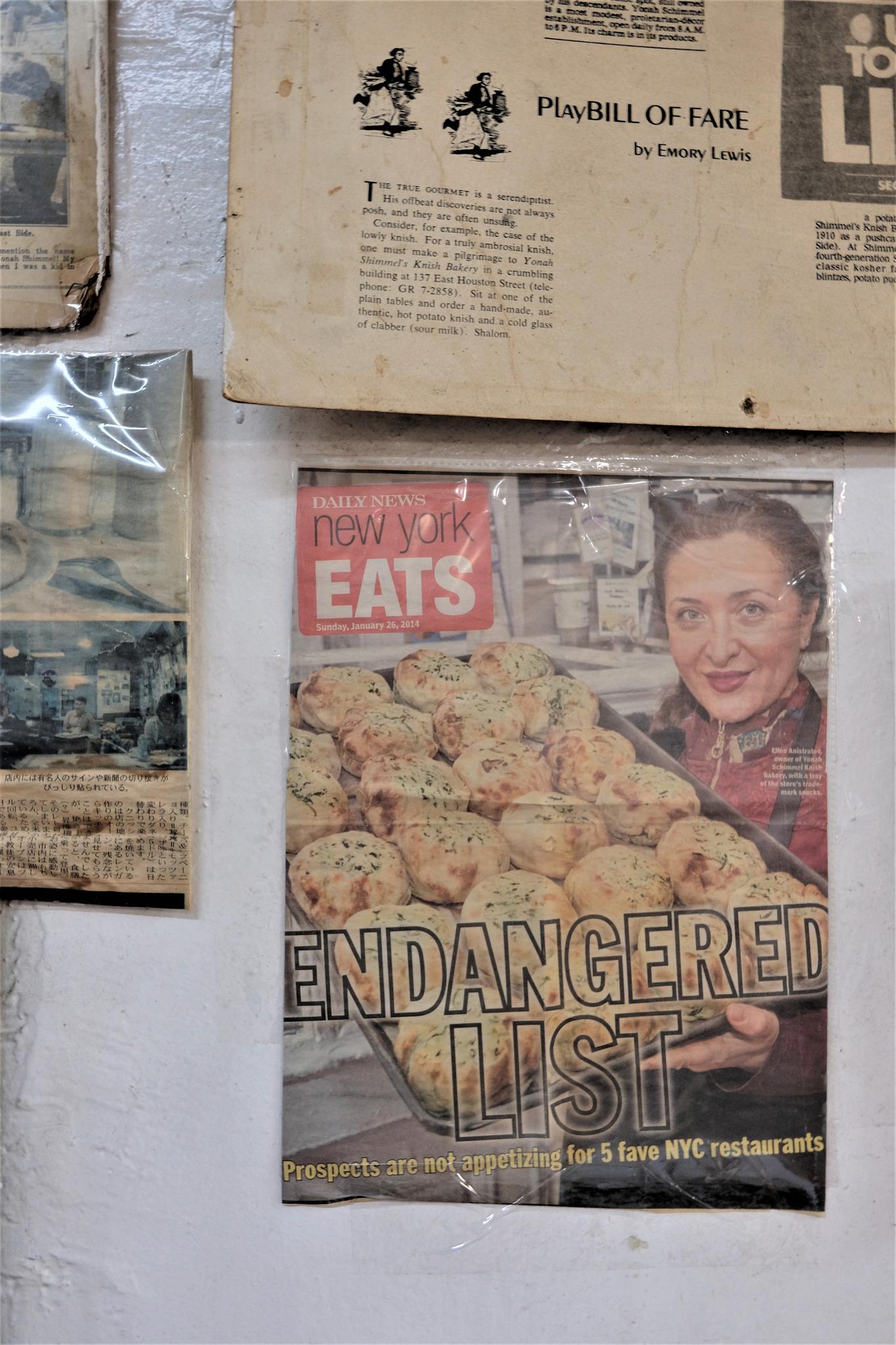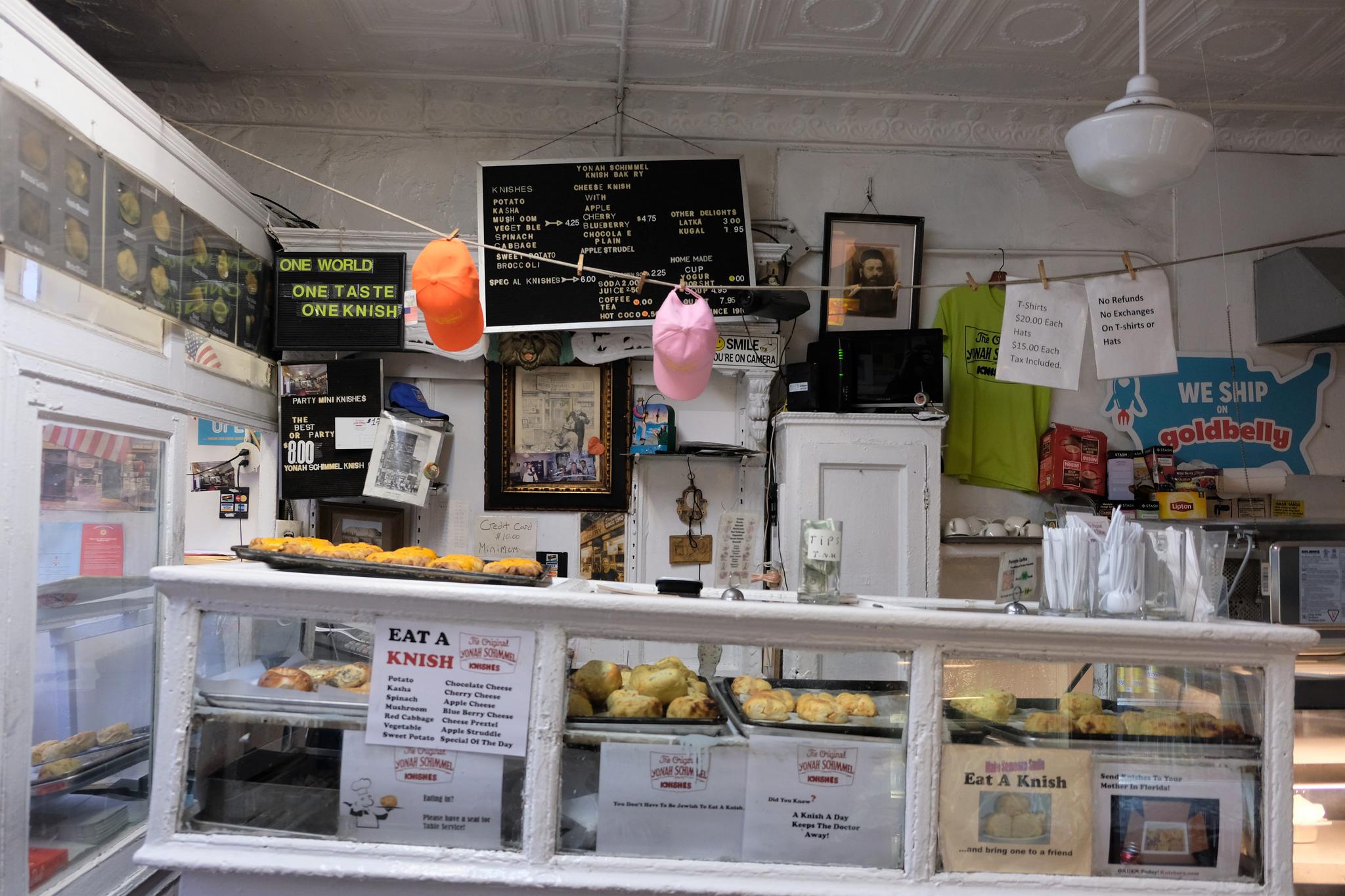The Granddaddy of Knishes
By: Emma Seiwell
March 8, 2020

In Nolita, Manhattan —a neighborhood now considered trendy with its upscale boutiques and up and coming restaurants— Yonah Schimmel's Knish Bakery has remained a neighborhood fixture on Houston Street where it’s resided since 1910. The storefront is rather unassuming with its original sign and its frame filled windows displaying yellowed newspaper articles written about the bakery.
“Listen, you can make whatever you want. Call it whatever you want. But if you haven't had a Yonah Schimmel knish, you never really had a knish.” said sixth-generation bakery owner Ellen Anistratov plainly. They call themselves the very first knishery in America. The shop’s undeniable authenticity and quality hasn’t gone unnoticed in New York.
Schimmel’s has been immortalized in film, literature, art and even in NYC political campaign fare of the 60’s. It was tradition for any newly elected politician to take a photo “with a knish in his face” according to a 1968 column called “Underground Eats” in New York Magazine. In 2009, the bakery was featured in a scene in Woody Allen’s film “Whatever Works.” Photos of famous New Yorkers who’ve visited are plastered on every wall. Eleanor Roosevelt, Francis Ford Coppola, John D. Rockefeller and Ron Howard are just a few notable figures that have frequented Schimmel’s through the years.
On a slow day, you can find Anistratov eating a knish fresh out of the oven, sitting at one of the shop’s six vintage tables. Trays of knishes are lifted upstairs in an original dumbwaiter from the basement ovens. She doesn’t have a favorite flavor knish and said her choice depends on her mood. While I spoke to her on this particular Tuesday afternoon, she polished off two traditional potato knishes paired with brown mustard between sentences.

The front counter, where knishes are displayed plainly. Their store logo reads “One World. One Taste. One Knish” on a vintage sign.
As a child she regularly frequented the lower east side bakery for knishes along with other Jewish comfort foods like latkes and kugel. In 1979, her family immigrated to America from a small village near Kiev in Ukraine. Her father, Alex Wolfson began working as a busboy in the bakery, their second day in America and worked his way up to owner, and then co-owner alongside Ellen. When considering the dynamics of their long work partnership, she very plainly stated, “He’s the boss.”
The bakery’s story began long before Ellen and her father, however. In 1890, when Eastern European scribe Yonah Schimmel immigrated to New York with hopes of teaching Torah, he found that the largely lower-class and immigrant population would not be able to support his religious endeavors. Forced to find an alternate source of income, Yonah Schimmel’s wife concocted the humble knish: a round thin dough shell filled with potato and spices, baked and never fried. Knish is a Yiddish word for dumpling.
When Schimmel and his wife began selling knishes off a pushcart in Coney Island, they became so popular that they decided to open a storefront on Houston Street. Eventually Schimmel returned to teaching Torah but his family continued running the bakery.
Ellen’s father claimed he was a distant cousin of Schimmel. Ellen credits the bakery’s long success to the legacy of Yonah Schimmel himself. She explained that in staying motivated in running the business she thinks of the scribe’s dedication to religion and how he “put all his love into the knish.” She deeply embraces the spiritual side of the bakery’s foundations. She stated, “The Bible doesn’t die. That’s why we’ve been around so long.”
Ellen has been running the bakery with her father for as long as she can remember though she hadn’t always planned to do so. She went to FIT with the dream to become a famous fashion designer. “Instead I started to design knishes.” she said with a chuckle.
In the old days, they sold four traditional flavors of knishes: plain, kasha, spinach and sweet potato. Ellen has expanded the menu by creating new flavors including, jalapeno cheddar, red cabbage, blueberry cheese and tomato mozzarella.
A tray of plain and sweet potato knishes fresh out of the oven, just lifted to the ground floor via dumbwaiter.
“I love cooking. People that come to my home— I make them a ten course meal or more.” she said with wide eyes and a small smile.
This passion for home-cooking lends itself to the intimate sense of comfort and tradition found inside the bakery. “It’s soothing, it’s warm, people come here and it feels like home for them.” she said on the knish.
Ellen had hoped for the business to grow much faster than it has. She said, “It almost feels like Yonah Schimmel is talking to me. I feel like there’s a bigger purpose for the store.” They already ship knishes nationwide, though Ellen would like to see Yonah Schimmel storefronts in every corner of the world, or at least in the country.
She envisions the knish becoming as ubiquitous and known as many universal foods that were originally just cultural specialties, like sushi or bagels. “An authentic knish is not a junk food, it’s not a street thing.” she said. She views the knish as its own unique thing. She stressed, “You don’t have to be Jewish to eat a knish.”
Anistratov smiles with a tray of knishes in hand, for the Daily News in 2014. The cover now hangs on a wall inside Yonah Schimmel’s.
Anistratov has three sons, and anticipates the business being passed down to the next generation. Her older son has pursued other things, but there’s a chance that her younger sons David and Joseph —21 and 22—might take over the bakery moving forward. Both of them regularly help their mother with the bakery already.
On Sunday March 29th, they will celebrate their 110th anniversary. Starting at noon, the first 110 knishes sold will be only $1.10 as opposed to their usual $4.75 price.
